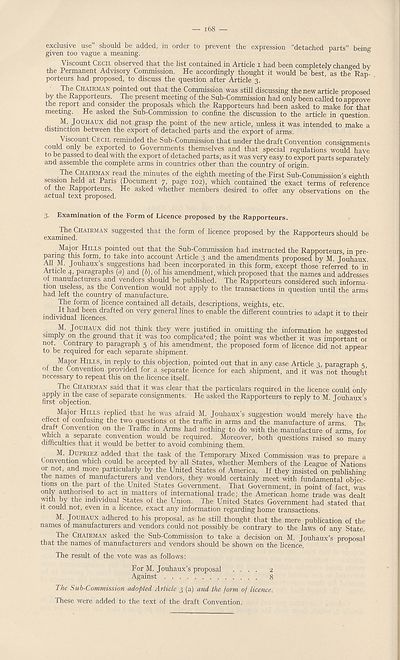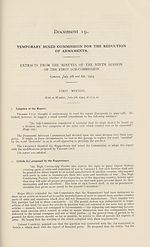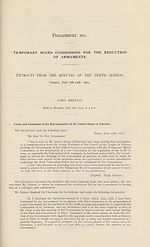Armament > Conference for the control of the international trade in arms, munitions and implements of war
(170)
Download files
Complete book:
Individual page:
Thumbnail gallery: Grid view | List view

168 —
exclusive use” should be added, in order to prevent the expression “detached parts” bein#
given too vague a meaning. 6
Viscount Cecil observed that the list contained in Article i had been completely changed by
the Permanent Advisory Commission. He accordingly thought it would be best as the Rap¬
porteurs had proposed, to discuss the question after Article 3. ’
The Chairman pointed out that the Commission was still discussing the new article proposed
by the Rapporteurs. The present meeting of the Sub-Commission had only been called to approve
the report and consider the proposals which the Rapporteurs had been asked to make for that
meeting. He asked the Sub-Commission to confine the discussion to the article in question.
M. Jquhahx did not grasp the point of the new article, unless it was intended to make a
distinction between the export of detached parts and the export of arms.
Viscount Cecil reminded the Sub-Commission that under the draft Convention consignments
could only be exported to Governments themselves and that special regulations would have
to be passed to deal with the export of detached parts, as it was very easy to export parts separately
and assemble the complete arms in countries other than the country of origin.
The Chairman read the minutes of the eighth meeting of the First Sub-Commission's eighth
session held at Pans (Document 7, page 102), which contained the exact terms of reference
ot the Rapporteurs. He asked whether members desired to offer any observations on the
actual text proposed.
3. Examination of the Form of Licence proposed by the Rapporteurs.
The Chairman suggested that the form of licence proposed by the Rapporteurs should be
examined.
Major Hills pointed out that the Sub-Commission had instructed the Rapporteurs, in pre-
parmg this form, to take into account Article 3 and the amendments proposed by M. Jouhaux.
All M. Jouhaux’s suggestions had been incorporated in this form, except those referred to in
r 1 tide 4, paiagraphs [a) and (6), of his amendment, which proposed that the names and addresses
of manufacture!s and vendors should be published. The Rapporteurs considered such informa¬
tion useless, as the Convention would not apply to the transactions in question until the arms
had left the country of manufacture.
I he form of licence contained all details, descriptions, weights, etc.
It had been drafted on very general lines to enable the different countries to adapt it to their
individual licences. y
M. Jouhaux did not think they were justihed in omitting the information he suggested
simply on the ground that it was too complicated; the point was whether it was important 01
not Contrary to paragraph 5 of his amendment, the proposed form of licence did not appear
to be required for each separate shipment.
Major Hills, in reply to this objection, pointed out that in any case Article 3, paragraph 3
of the Convention provided for a separate licence for each shipment, and it was not thought
necessary to repeat this on the licence itself.
The Chairman said that it was clear that the particulars required in the licence could only
apply in the case of separate consignments. He asked the Rapporteurs to reply to M Touhaux’s
first objection.
Major Hills replied that he was afraid M. Jouhaux’s suggestion would merely have the
effect of confusing the two questions ot the traffic in arms and the manufacture of arms. The
if- u I"onvenfi°n on the Traffic in Arms had nothing to do with the manufacture of arms, for
i ^ seParate convention would be required. Moreover, both questions raised so many
difficulties that it would be better to avoid combining them.
M. Dupriez added that the task of the lemporary Mixed Commission was to prepare a
Convention which could be accepted by all States, whether Members of the League of Nations
or not, and more particularly by the United States of America. If they insisted on publishing
the names of manufacturers and vendors, they would certainly meet with fundamental objec¬
tions on the part of the United States Government. That Government, in point of fact, was
only authorised to act in matters of international trade; the American home trade was dealt
with by the individual .States of the Union. The Lffiited States Government had stated that
it could not, even m a licence, exact any information regarding home transactions.
M. Jouhaux adhered to his proposal, as he still thought, that the mere publication of the
names of manufacturers and vendors could not possibly be contrary to the laws of any State.
Ihe Chairman asked the Sub-Commission to take a decision on M. Jouhaux’s proposal
that the names of manufacturers and vendors should be shown on the licence.
The result of the vote was as follows:
For M. Jouhaux’s proposal .... 2
Against 8
The Sub-Commission adopted Article 3 (a) and the form of licence.
These were added to the text of the draft Convention.
exclusive use” should be added, in order to prevent the expression “detached parts” bein#
given too vague a meaning. 6
Viscount Cecil observed that the list contained in Article i had been completely changed by
the Permanent Advisory Commission. He accordingly thought it would be best as the Rap¬
porteurs had proposed, to discuss the question after Article 3. ’
The Chairman pointed out that the Commission was still discussing the new article proposed
by the Rapporteurs. The present meeting of the Sub-Commission had only been called to approve
the report and consider the proposals which the Rapporteurs had been asked to make for that
meeting. He asked the Sub-Commission to confine the discussion to the article in question.
M. Jquhahx did not grasp the point of the new article, unless it was intended to make a
distinction between the export of detached parts and the export of arms.
Viscount Cecil reminded the Sub-Commission that under the draft Convention consignments
could only be exported to Governments themselves and that special regulations would have
to be passed to deal with the export of detached parts, as it was very easy to export parts separately
and assemble the complete arms in countries other than the country of origin.
The Chairman read the minutes of the eighth meeting of the First Sub-Commission's eighth
session held at Pans (Document 7, page 102), which contained the exact terms of reference
ot the Rapporteurs. He asked whether members desired to offer any observations on the
actual text proposed.
3. Examination of the Form of Licence proposed by the Rapporteurs.
The Chairman suggested that the form of licence proposed by the Rapporteurs should be
examined.
Major Hills pointed out that the Sub-Commission had instructed the Rapporteurs, in pre-
parmg this form, to take into account Article 3 and the amendments proposed by M. Jouhaux.
All M. Jouhaux’s suggestions had been incorporated in this form, except those referred to in
r 1 tide 4, paiagraphs [a) and (6), of his amendment, which proposed that the names and addresses
of manufacture!s and vendors should be published. The Rapporteurs considered such informa¬
tion useless, as the Convention would not apply to the transactions in question until the arms
had left the country of manufacture.
I he form of licence contained all details, descriptions, weights, etc.
It had been drafted on very general lines to enable the different countries to adapt it to their
individual licences. y
M. Jouhaux did not think they were justihed in omitting the information he suggested
simply on the ground that it was too complicated; the point was whether it was important 01
not Contrary to paragraph 5 of his amendment, the proposed form of licence did not appear
to be required for each separate shipment.
Major Hills, in reply to this objection, pointed out that in any case Article 3, paragraph 3
of the Convention provided for a separate licence for each shipment, and it was not thought
necessary to repeat this on the licence itself.
The Chairman said that it was clear that the particulars required in the licence could only
apply in the case of separate consignments. He asked the Rapporteurs to reply to M Touhaux’s
first objection.
Major Hills replied that he was afraid M. Jouhaux’s suggestion would merely have the
effect of confusing the two questions ot the traffic in arms and the manufacture of arms. The
if- u I"onvenfi°n on the Traffic in Arms had nothing to do with the manufacture of arms, for
i ^ seParate convention would be required. Moreover, both questions raised so many
difficulties that it would be better to avoid combining them.
M. Dupriez added that the task of the lemporary Mixed Commission was to prepare a
Convention which could be accepted by all States, whether Members of the League of Nations
or not, and more particularly by the United States of America. If they insisted on publishing
the names of manufacturers and vendors, they would certainly meet with fundamental objec¬
tions on the part of the United States Government. That Government, in point of fact, was
only authorised to act in matters of international trade; the American home trade was dealt
with by the individual .States of the Union. The Lffiited States Government had stated that
it could not, even m a licence, exact any information regarding home transactions.
M. Jouhaux adhered to his proposal, as he still thought, that the mere publication of the
names of manufacturers and vendors could not possibly be contrary to the laws of any State.
Ihe Chairman asked the Sub-Commission to take a decision on M. Jouhaux’s proposal
that the names of manufacturers and vendors should be shown on the licence.
The result of the vote was as follows:
For M. Jouhaux’s proposal .... 2
Against 8
The Sub-Commission adopted Article 3 (a) and the form of licence.
These were added to the text of the draft Convention.
Set display mode to:
![]() Universal Viewer |
Universal Viewer | ![]() Mirador |
Large image | Transcription
Mirador |
Large image | Transcription
Images and transcriptions on this page, including medium image downloads, may be used under the Creative Commons Attribution 4.0 International Licence unless otherwise stated. ![]()
| League of Nations > Armament > Conference for the control of the international trade in arms, munitions and implements of war > (170) |
|---|
| Permanent URL | https://digital.nls.uk/195383973 |
|---|
| Shelfmark | LN.IX |
|---|
| Description | Over 1,200 documents from the non-political organs of the League of Nations that dealt with health, disarmament, economic and financial matters for the duration of the League (1919-1945). Also online are statistical bulletins, essential facts, and an overview of the League by the first Secretary General, Sir Eric Drummond. These items are part of the Official Publications collection at the National Library of Scotland. |
|---|---|
| Additional NLS resources: |
|

